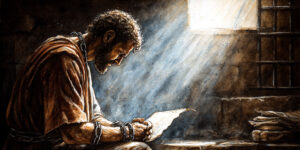
Is Persecution Normal
In a world where comfort is often confused with blessing, reading Paul’s words in 2 Corinthians 11:23–30 is like stepping into a different reality—a reality where faith comes at a
In the past God spoke to our ancestors through the prophets at many times and in various ways, but in these last days he has spoken to us by his Son, whom he appointed heir of all things, and through whom also he made the universe. The Son is the radiance of God’s glory and the exact representation of his being, sustaining all things by his powerful word. After he had provided purification for sins, he sat down at the right hand of the Majesty in heaven. So he became as much superior to the angels as the name he has inherited is superior to theirs.
The Son Superior to Angels
For to which of the angels did God ever say,
“You are my Son; today I have become your Father”?
Or again,
“I will be his Father, and he will be my Son”?
And again, when God brings his firstborn into the world, he says,
“Let all God’s angels worship him.”
In speaking of the angels he says,
“He makes his angels spirits, and his servants flames of fire.”
But about the Son he says,
“Your throne, O God, will last for ever and ever; a scepter of justice will be the scepter of your kingdom.
You have loved righteousness and hated wickedness; therefore God, your God, has set you above your companions by anointing you with the oil of joy.”
He also says,
“In the beginning, Lord, you laid the foundations of the earth, and the heavens are the work of your hands.
They will perish, but you remain; they will all wear out like a garment. You will roll them up like a robe; like a garment they will be changed.
But you remain the same, and your years will never end.” To which of the angels did God ever say,
“Sit at my right hand until I make your enemies a footstool for your feet”?Hebrews 1:1-13
The Christmas season has arrived, bringing with it a spirit of reflection, celebration, and anticipation. While December 25th is the day traditionally set aside for Christmas, Advent marks the season leading up to it — a time to prepare our hearts and minds for the coming of Christ.
The Waiting and Misunderstanding of the Messiah
For centuries, people awaited the Messiah with great expectation. However, their understanding of His coming was often clouded by misconceptions. Even John the Baptist, whose arrival was foretold as the precursor to the Messiah, was sometimes mistaken for the Savior himself. People added their own interpretations to Scripture, shaping a vision of the Messiah that reflected their desires rather than God’s plan.
Misunderstandings about God’s work are not confined to the past. Today, we often impose our expectations on Him, limiting our ability to fully receive His blessings. Thankfully, God’s plans are not thwarted by our misconceptions, but we must strive to remain teachable, especially during the Christmas season.
Learning from God’s Revelations
Throughout history, God revealed Himself in extraordinary ways: through prophets, a burning bush, the parting of the Red Sea, and even a pillar of fire and smoke. Each of these events demonstrated His presence and power, providing guidance and assurance to His people.
Yet, as awe-inspiring as these revelations were, they pale in comparison to the ultimate revelation of God — Jesus Christ. When Jesus was born, God stepped into humanity to live among us. This was not just another birth; it was the culmination of God’s plan to restore His relationship with humanity. The birth of Christ is the pinnacle of God’s revelation, a truth we must hold onto amidst the distractions of the season.
Guarding the True Meaning of Christmas
The world offers countless diversions that can draw our attention away from the true meaning of Christmas. Whether it’s materialism, tradition, or even fatigue from holiday preparations, these distractions can diminish the significance of this holy season. As the book of Revelation warns, we must not lose sight of our first love — our relationship with Christ — or let the world take away our joy and purpose.
The heart of Christmas lies in the Gospel: Jesus came into the world to save us from sin, to restore fellowship with God, and to offer us eternal life. His birth leads to His ministry, His death on the cross, and His resurrection — all of which are central to our faith.
Finding Joy in the Light
Despite the commercialism that often surrounds Christmas, we can choose to see its deeper meaning. Twinkling lights, for instance, can serve as a powerful reminder of Christ’s declaration: “I am the light of the world”. Whether those lights were put up for decoration, advertising, or tradition, their true significance lies in what they can represent to us.
As we walk through brightly lit streets or admire the decorations around us, let each light remind us of the light that Jesus brought into the world. Amid the chaos and noise, let us reclaim the joy and peace of Christmas by focusing on the One it’s truly about.
Conclusion: Embracing the Gospel in Christmas
The story of the woman in the elevator captures the tension many feel during the holiday season. Overwhelmed by the pressures of shopping and preparations, she quipped, “Whoever started this whole Christmas thing should be found, strung up, and shot.” From the back of the elevator came a calm reply: “Don’t worry. We already crucified Him.” The profound truth in this response is a reminder that Christmas is about the Gospel — the good news that God became man, lived among us, and gave His life to save us.
As we journey through Advent and Christmas, let us keep our focus on Jesus. Celebrate His birth, marvel at His life, and rejoice in His promise of salvation. Every light, every carol, every quiet moment of reflection can be an opportunity to draw closer to Him. For in Jesus, we find the ultimate gift — hope, love, and redemption.
1.12.2024

In a world where comfort is often confused with blessing, reading Paul’s words in 2 Corinthians 11:23–30 is like stepping into a different reality—a reality where faith comes at a
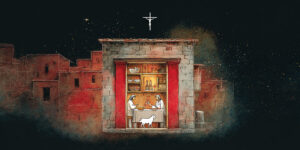
God gives Moses and Aaron very specific instructions about the Passover meal. Outsiders could not participate unless they fully entered into the covenant community…

People misunderstand the relationship between faith and works, pitting Paul and James against one another. But this is a false divide…

In Romans chapter 4, the Apostle Paul unpacks a profound theological truth centered on Abraham and the nature of faith…
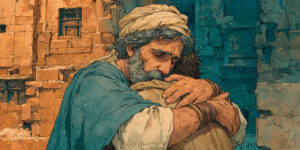
Jesus delivers a story that holds profound truths about our relationship with God, the nature of repentance, and the character of our Heavenly Father…

The God who had spoken through burning bushes and mountain thunder now came to dwell within His people…
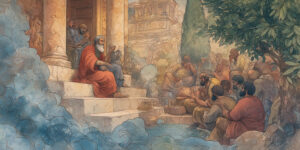
The Apostle Paul meets a group of twelve men in Ephesus—students of John the Baptist—who have not yet received the Holy Spirit. Their story teaches us something essential…

It’s easy to embrace Jesus as a baby in a manger. It’s also powerful to reflect on Jesus on the cross. Both images stir the heart…
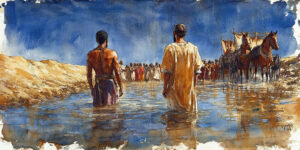
The Ethiopian official was a treasurer in service to Candace, queen of the Ethiopians.
Yet Philip—prompted by the Spirit of God—approaches him. It must have taken courage…

In the Gospel of Luke, chapter 2, we find a rare glimpse into the childhood of Jesus. It’s the only story we have between His birth and the beginning of